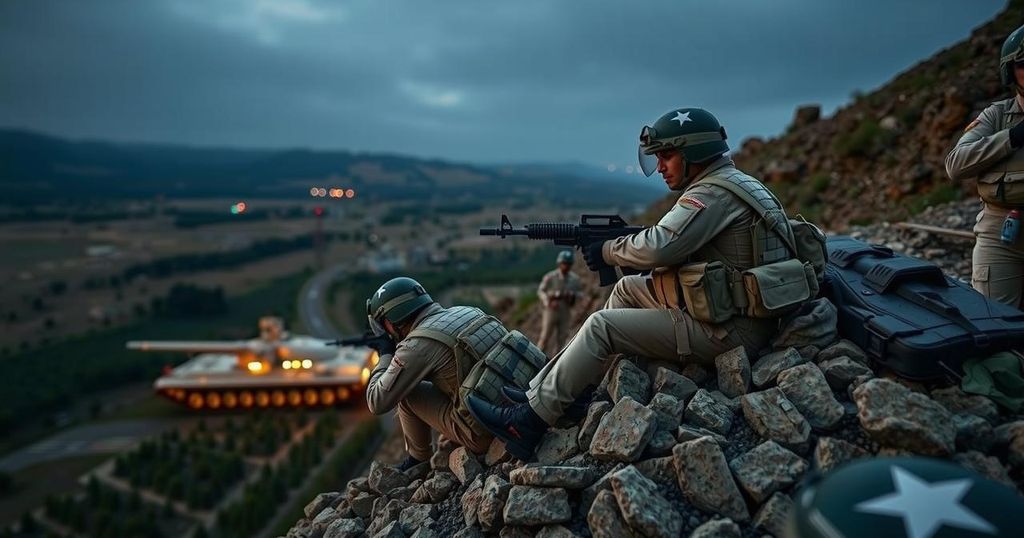Global news
AFRICA, AL AKHBAR, ALPHA LINE, ASIA, AV, AVIGDOR LIEBERMAN, CONFLICT, DAMASCUS, DARAA, EGYPT, EUROPE/ASIA, GAZA, GAZA STRIP, GOLAN, GOLAN HEIGHTS, HAI, HAIDAR MUSTAFA, HEZBOLLAH, HMEIMIM, ISRAEL, ISRAELI KNESSET, LATAKIA, LEBANON, MILITARY OPERATIONS, MOSCOW, MOUNT HERMON, NORTH AMERICA, QUNEITRA, RETALIATION, RUSSIA, SYRIA, TEL AVIV, UN, UNITED STATES, WAR, WEST BANK
Isaac Bennett
0 Comments
Russia Enhances Military Presence Near Golan Heights to Counter Israeli Actions
The Russian army has increased its presence in southern Syria to counter potential Israeli escalations, particularly in the Golan Heights region. Israel’s construction of a separation wall has raised concerns over violations of ceasefire agreements and international law. Increased Israeli airstrikes and military operations signal an ongoing conflict dynamic under scrutiny from global powers and organizations.
On November 19, the Lebanese daily Al Akhbar reported significant increases in the Russian army’s presence across nine observation posts in southern Syria, strategically enhanced to aid Damascus in preventing potential escalations from Israel. This bolstering aligns with developments in the Daraa and Quneitra governorates, located adjacent to the Israeli-occupied Golan Heights, where Israel has initiated plans to erect a separation wall, reminiscent of barriers established along its borders with Lebanon, Egypt, Gaza, and the West Bank.
Recent allegations from the United Nations claim that Israel has violated a longstanding ceasefire agreement with Syria, instigating construction efforts for this wall. Satellite imagery corroborated by the Associated Press has revealed extensive infrastructure developments spanning approximately 7.5 kilometers along the Alpha Line, secured by Israeli armored vehicles and military tanks.
Israeli Knesset member Avigdor Lieberman cautioned last month, warning that should Syria persist in functioning as a logistical hub for Israel’s adversaries, Israel may assert control over the Syrian section of Mount Hermon. The advancing Israeli incursions into occupied Syrian territory coincide with an escalation in coordinated operations between the Russian and Syrian military forces against extremist factions backed by the West.
According to Al Akhbar, Russian troops are engaged in both aerial and ground surveillance to enhance regional security and facilitate the return of displaced individuals while maintaining stability, following a prior Russia-mediated disengagement agreement that restored governmental control to Damascus.
Haidar Mustafa, writing for The Cradle, articulated, “All Israeli actions in the Golan, including the imposition of Israeli citizenship, settlement expansions, and attempts to breach the disengagement zone to construct a separation wall, are still today considered flagrant violations of international law.” The frequency of Israeli airstrikes against Syria has surged significantly in the recent months, particularly after the escalation of the conflict in Lebanon. Many of these attacks have occurred near Russia’s Hmeimim airbase, compelling Moscow to activate its air defense systems.
The geopolitical landscape in the region surrounding the Golan Heights reflects long-standing tensions between Israel, Syria, and their respective allies, notably including Russia. U.N. resolutions have characterized Israel’s occupation of the Golan Heights since 1967 as illegal under international law. The area has been a focal point for military confrontations, and the ongoing civil conflict in Syria has further complicated issues of territorial integrity and national sovereignty. Russia’s involvement has been pivotal, as it balances its relationships with both the Syrian government and Israel while attempting to stabilize the region post-conflict.
In summary, Russia’s intensified military presence along the Golan Heights underscores a strategic maneuver to curb potential Israeli provocations while reinforcing Syrian control in the area. Regional dynamics continue to evolve against a backdrop of military operations and international law violations allegations. The interplay of military actions and diplomatic negotiations will undoubtedly shape the future of this contested territory, with international observers closely monitoring developments.
Original Source: thecradle.co




Post Comment